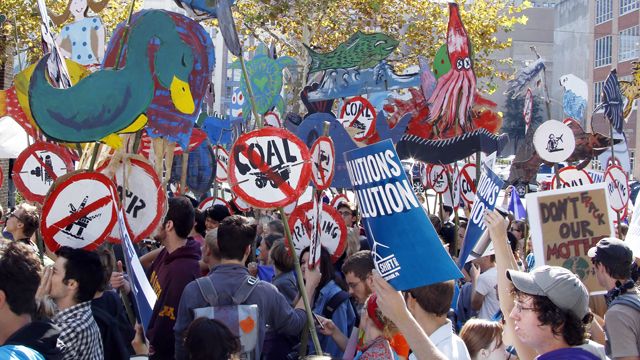
Journalist Naomi Klein writes in Britain’s New Statesman magazine that scientists often use softer language than they should when presenting their findings about the inevitability of climate change and the destruction it will bring. But now some scientists are raising their voices and taking action, demanding dramatic changes in the cultural and economic systems that are to blame for our fossil fuel dependency.
Klein starts with a talk by one UC-San Diego researcher, Brad Werner, who presented a talk at a American Geophysical Union conference last year entitled: “Is Earth F**ked? Dynamical Futility of Global Environmental Management and Possibilities for Sustainability via Direct Action Activism.”
“When pressed by a journalist for a clear answer on the ‘are we f**ked’ question,” Klein writes, “Werner set the jargon aside and replied, ‘More or less.'”
There was one dynamic in the model, however, that offered some hope. Werner termed it “resistance” – movements of “people or groups of people” who “adopt a certain set of dynamics that does not fit within the capitalist culture”. According to the abstract for his presentation, this includes “environmental direct action, resistance taken from outside the dominant culture, as in protests, blockades and sabotage by indigenous peoples, workers, anarchists and other activist groups”.
Serious scientific gatherings don’t usually feature calls for mass political resistance, much less direct action and sabotage. But then again, Werner wasn’t exactly calling for those things. He was merely observing that mass uprisings of people – along the lines of the abolition movement, the civil rights movement or Occupy Wall Street – represent the likeliest source of “friction” to slow down an economic machine that is careening out of control. We know that past social movements have “had tremendous influence on . . . how the dominant culture evolved”, he pointed out. So it stands to reason that, “if we’re thinking about the future of the earth, and the future of our coupling to the environment, we have to include resistance as part of that dynamics”. And that, Werner argued, is not a matter of opinion, but “really a geophysics problem”.
Plenty of scientists have been moved by their research findings to take action in the streets. Physicists, astronomers, medical doctors and biologists have been at the forefront of movements against nuclear weapons, nuclear power, war, chemical contamination and creationism. And in November 2012, Nature published a commentary by the financier and environmental philanthropist Jeremy Grantham urging scientists to join this tradition and “be arrested if necessary”, because climate change “is not only the crisis of your lives – it is also the crisis of our species’ existence”.
Read the full article at the New Statesman »
About a year ago, in the days after Hurricane Sandy hit New York, Naomi Klein spoke with Bill Moyers about setting priorities in the wake of a natural disaster.
“Here you have a crisis that was created by a collision between heavy weather — which may or may not have been linked to climate change, but certainly it’s what climate change looks like — colliding with weak infrastructure, because of years and years of neglect,” Klein told Moyers. And the free market solutions to this crisis are, ‘Let’s just get rid of the public infrastructure altogether and drill for more oil, which is the root cause of climate change.’ So that’s their shock doctrine. And I think it’s time for a people’s shock.”
She later explained that a similar “people’s shock” had been seen before in American history, after the stock market crash of 1929 set off the Great Depression. People “wanted to get at the root of the problem,” Klein said. “[T]hey wanted to get away from speculative finance and that’s how we got some very good legislation passed in this country like Glass-Steagall, and much of the social safety net was born in that moment. Not by exploiting crisis to horde power for the few and to ram through policies that people don’t want, but to build popular movements and to really deepen democracy.”
Watch “Naomi Klein on Capitalism and Climate Change”:

